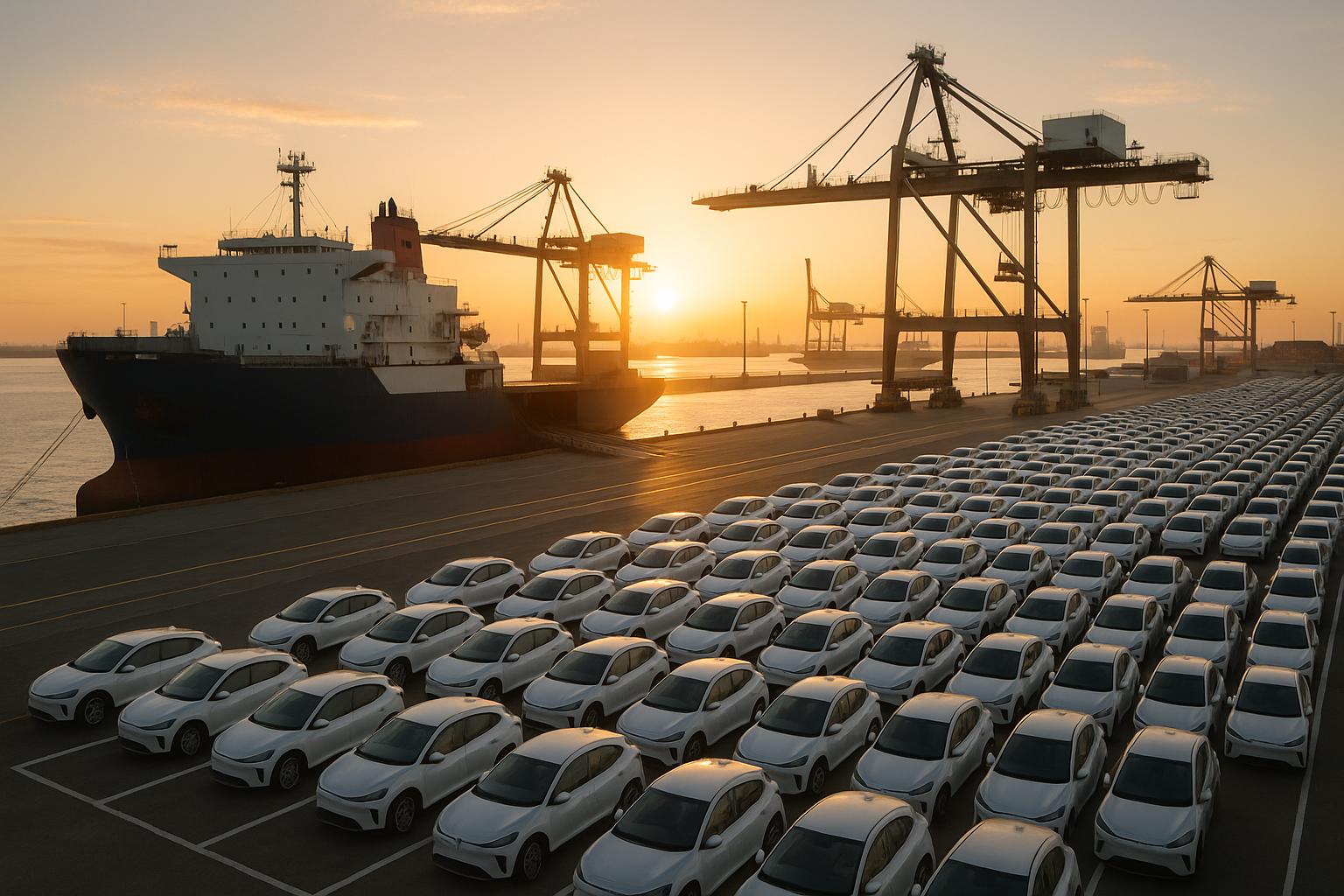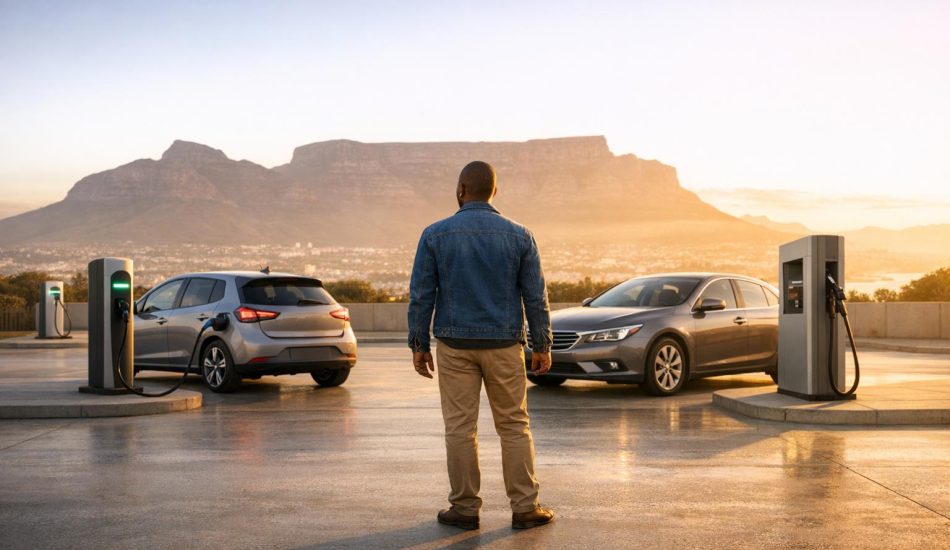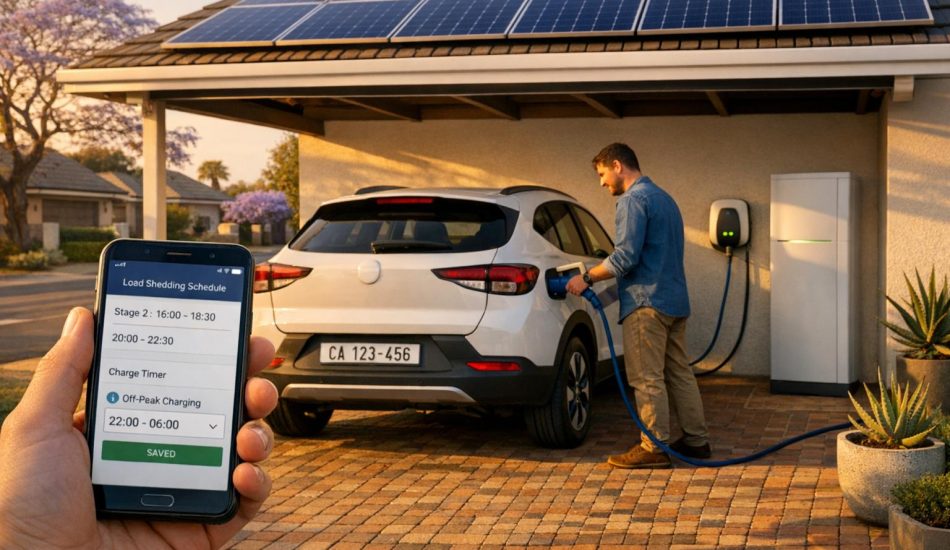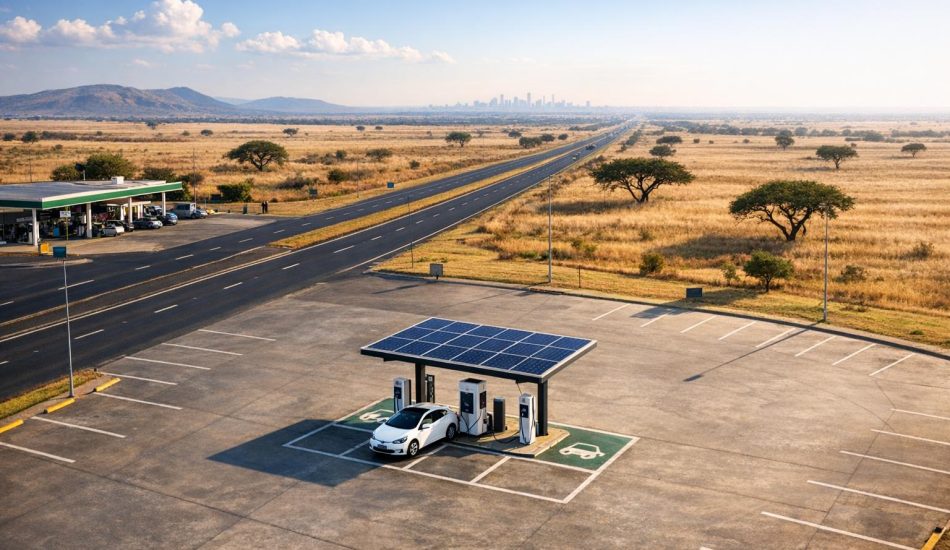
In 2025, African countries are reshaping electric vehicle (EV) import rules with new incentives, tax adjustments, and compliance requirements. These changes aim to promote EV adoption, reduce emissions, and improve transportation options. Here’s a quick rundown of the key updates:
- Kenya: Considering VAT exemptions and age restrictions for imported EVs, but details remain unclear.
- Rwanda: Removed all import duties on EVs and banned new gas-powered motorcycles.
- Uganda: Reinstated import duties on EVs, increasing costs for importers and buyers.
- Ethiopia: Banned gasoline and diesel vehicle imports starting in 2024; updates on local EV assembly incentives are awaited.
- South Africa: Offers tax deductions for local EV production starting in 2026, but high import duties (25%) on EVs remain.
- Malawi: Discussing duty waivers for electric two-wheelers, with more details pending.
- Nigeria: Introduced VAT exemptions and reduced import duties for EVs and related services.
- Morocco: Tariff exemptions apply only to hybrid vehicles, excluding fully electric ones.
Quick Comparison
| Country | Key Update | Impact on Importers | Impact on Consumers |
|---|---|---|---|
| Kenya | VAT exemptions, possible age restrictions | Lower costs (if confirmed) | May make EVs cheaper but limit options |
| Rwanda | 0% duties on EVs; ICE motorcycle ban | Reduced costs | Cheaper EVs, focus on electric motorcycles |
| Uganda | Reinstated import duties on EVs | Higher costs | EVs less affordable |
| Ethiopia | ICE vehicle import ban (2024) | Uncertainty on EV incentives | No clear impact yet |
| South Africa | 150% tax deduction for local production (2026) | No immediate benefit | EVs remain expensive due to duties |
| Malawi | Duty waiver for electric two-wheelers | Lower costs for two-wheeler imports | Cheaper electric scooters |
| Nigeria | VAT exemptions, reduced duties | Lower import costs | Gradual price reductions |
| Morocco | Tariff exemptions for hybrids only | Limited benefits for EV imports | More affordable hybrids, not EVs |
These updates reflect varied approaches across the region, with some countries easing costs for EV imports while others focus on local production or specific vehicle types. Staying informed is essential as policies evolve.
African governments welcome Chinese electric vehicle imports, production amid looming trade war
1. Kenya: VAT Exemptions and Age Restrictions
Kenya is considering updates to its electric vehicle (EV) import regulations as part of its 2025 policy review. While there’s talk of potential changes – like adjustments to VAT policies and the introduction of age limits for imported EVs – no official statements have confirmed the specifics yet.
Tax and Duty Adjustments
The government might revise its tax structure for EV imports, possibly reducing VAT and excise duties. Along with that, there’s a chance import documentation and customs processes could be simplified. However, the exact details are still under wraps.
Potential Impact on the Market
If age restrictions are implemented, it could limit the availability of used EVs in the market. On the other hand, any tax reductions would likely lower import costs, potentially boosting accessibility and reshaping Kenya’s emerging EV sector. Stakeholders should stay alert for official updates to ensure they’re informed about any new regulations.
Keep an eye out for announcements from Kenyan authorities for the latest developments.
2. Rwanda: Duty Exemptions and ICEV Ban
In 2025, Rwanda took a bold step by removing import duties and taxes on electric vehicles (EVs) and implementing a ban on registering new motorcycles powered by internal combustion engines, allowing only electric models.
Policy Changes and Market Impact
Rwanda’s decision to eliminate import duties and taxes on EVs is a significant move in its push for broader EV adoption. This measure not only makes EVs more affordable for consumers but also brings Rwanda in line with other African nations like Zambia and Mauritius, which have introduced similar incentives. Another major shift comes with the regulation starting in January 2025, which restricts motorcycle registrations exclusively to electric models. By prohibiting the registration of new internal combustion engine motorcycles, this policy is expected to drive demand for electric two-wheelers and reshape the country’s motorcycle market.
3. Uganda: Reversal of Duty Exemptions
In 2025, Uganda made a notable policy shift by reinstating standard import duties and taxes on electric vehicles (EVs), effectively reversing the duty exemptions that had previously been in place.
Tax and Duty Adjustments
Under this revised policy, all electric vehicles – including passenger cars and commercial trucks – are now subject to the same standard import duty structure as other vehicles. This change has led to higher landed costs for EV importers in Uganda, making these vehicles more expensive to bring into the country.
Market Impact and Business Challenges
The reintroduction of duties has already begun to reshape Uganda’s electric vehicle market. Importers and stakeholders are being forced to reevaluate their pricing strategies to address the increased costs, which could make EVs less competitive when compared to traditional vehicles. For importers, this raises a tough question: should they absorb these additional costs, or pass them along to consumers?
This shift also impacts fleet operators and private buyers, who must now reconsider the overall value of investing in electric vehicles. Industry experts suggest that importers may need to rethink their business models to stay competitive in this changing landscape. Uganda’s situation mirrors similar challenges faced by other African markets, where evolving policies are influencing the growth and adoption of electric vehicles.
4. Ethiopia: Ban on New ICEV Imports and Local Assembly Incentives
At this time, there’s no official word from Ethiopia regarding a ban on new internal combustion engine vehicle (ICEV) imports or the introduction of incentives to promote local electric vehicle (EV) assembly in 2025. Any updates will be shared when official announcements are made.
As with other countries navigating regulatory changes, it’s important for stakeholders to keep a close eye on Ethiopia for potential policy updates.
5. South Africa: Production Tax Deductions and Import Tariff Changes
South Africa’s electric vehicle (EV) policy in 2025 captures a mix of forward movement and lingering obstacles. While steps have been taken to encourage local EV production, high import duties remain a significant hurdle to wider adoption.
Tax and Duty Adjustments
One of the most notable initiatives is the introduction of a 150% tax deduction for investments in local electric and hydrogen vehicle production. However, this incentive won’t take effect until 2026, delaying its potential impact.
On the other hand, import duties on EVs remain steep at 25%, which is notably higher than the 18% duty applied to combustion engine vehicles. This disparity creates a "reverse incentive" that makes importing EVs more expensive than traditional gas-powered cars, slowing their accessibility and adoption.
Challenges for Importers and Market Impact
The current duty structure poses a significant challenge to EV market growth. Industry group CHARGE highlights the issue:
"This incentive to boost local manufacturing is a positive step forward, but we also need to reduce the current high import duties for EVs – 25% compared to 18% for combustion engine vehicles. These taxes inflate EV prices, slow demand, and limit market growth."
The 25% import duty raises the cost of EVs significantly, making traditional vehicles more attractive to consumers. Despite repeated calls from the industry to lower these duties and promote EV adoption, no changes were made in 2025. This leaves the market in a holding pattern, relying on either future adjustments to import policies or the eventual rollout of production incentives in 2026. These dynamics highlight the delicate balance South Africa faces in shaping its EV landscape and influencing broader policies across the continent.
sbb-itb-99e19e3
6. Malawi: Import and Excise Duty Waiver on Electric Two-Wheelers
Malawi is gradually shaping its policies around electric two-wheelers, much like other nations revisiting their stance on electric vehicles. While there’s ongoing discussion about a potential import and excise duty waiver for electric two-wheelers set for 2025, specific details are yet to be officially confirmed.
For the latest developments, keep an eye on EV24.africa as updates are expected to shed more light on Malawi’s evolving approach to electric mobility, aligning with broader shifts in EV policies across the continent.
7. Nigeria: Lower Import Duties and VAT Exemption
Nigeria has introduced new regulations to make electric vehicles (EVs) more accessible for importers and consumers alike. Here’s a closer look at the tax and duty changes driving this development.
Tax and Duty Adjustments
Starting September 1, 2024, the VAT Modification Order 2024 exempts electric vehicles and their assembly parts from Value Added Tax (VAT). This exemption also covers services related to EV manufacturing, assembly, and sales, offering significant cost relief for businesses and consumers alike.
Additionally, EVs are no longer subject to the Import Adjustment Tax (IAT), which is typically applied to certain internal combustion engine vehicles based on their engine size.
Policy Impact and Market Benefits
These changes translate into lower overall import costs for EVs and related assembly services, significantly reducing the tax burden compared to traditional internal combustion vehicles. This shift is expected to make EVs more affordable and create a supportive environment for their adoption in Nigeria.
8. Morocco: Tariff Exemptions for Hybrids Only, Not EVs
Morocco has taken a unique stance when it comes to vehicle import tariffs, drawing a clear line between hybrid and fully electric vehicles. Starting in 2025, the country introduced tariff exemptions that apply only to hybrid vehicles. This includes both traditional hybrids and plug-in hybrids (PHEVs), which combine an internal combustion engine with an electric motor. However, fully electric vehicles (BEVs) don’t benefit from these exemptions and continue to face standard import duties.
Country Comparison Table
This table highlights the key regulatory updates impacting EV imports across select African countries in 2025. The approaches to EV imports vary widely, with some nations introducing sweeping incentives, while others implement more specific measures. Here’s a breakdown of the updates:
| Country | Regulatory Change | Tax/Tariff Impact | Importer Effects | Consumer Impact |
|---|---|---|---|---|
| Kenya | Possible VAT exemptions and age restrictions on imported EVs | Likely VAT reductions alongside new compliance rules | Uncertain cost implications until policies are finalized | Potential price savings, though options may remain limited |
| Rwanda | 0% import duties on all EVs; ICE motorcycle ban | Full elimination of import duties | Significant cost savings for importers | Major price reductions, making EVs more affordable |
| Ethiopia | Pending updates on ICE vehicle imports and local assembly incentives | Awaiting official announcements | Regulatory uncertainty persists | No clear impact until policies are clarified |
| Malawi | Waiver on import and excise duties for electric two-wheelers | Reduced tax burden for specific EV categories | Better economics for importing electric two-wheelers | Lower costs for electric scooters and motorcycles |
| Nigeria | Lower import duties, VAT exemption, and removal of Import Adjustment Tax (IAT) | Overall reduction in tax obligations | More predictable operational costs for importers | Gradual price decreases as incentives take hold |
| Morocco | Tariff exemptions for hybrids only, excluding EVs | Duty benefits limited to hybrid vehicles | Mixed impacts depending on vehicle type | Price advantages restricted to hybrid models |
The table reflects the diverse strategies shaping EV imports across the continent.
Rwanda and Malawi stand out with the most comprehensive incentives for EV imports. Rwanda’s complete removal of import duties, combined with its ICE motorcycle ban, creates a highly favorable environment for EV adoption. Malawi’s focus on electric two-wheelers also signals a push toward affordable electric mobility.
Nigeria is taking a broader approach by eliminating multiple tax barriers, which could gradually reduce EV prices. In contrast, Morocco’s selective strategy favors hybrids, limiting benefits for full EVs. Meanwhile, Kenya and Ethiopia are still in flux, with pending or potential updates that could significantly influence their EV markets.
Countries with clear and extensive incentives are already attracting attention from international EV manufacturers eager to expand into African markets.
Conclusion
The year 2025 has brought sweeping changes to Africa’s electric vehicle (EV) import rules, reshaping the landscape with lower costs but introducing new compliance hurdles. These shifts, as outlined earlier, are driving a dynamic transformation in the region’s EV market.
Rwanda has emerged as a frontrunner with its full duty exemptions and a bold ban on internal combustion engine vehicles (ICEVs). Meanwhile, Malawi has taken a practical approach by prioritizing electric two-wheelers to meet everyday mobility needs. Morocco and Nigeria have implemented targeted incentives that significantly reduce import costs, offering clear financial advantages for businesses and consumers alike. On the other hand, Uganda’s decision to reverse duty exemptions highlights the unpredictability of policies, posing a risk for importers and investors.
Lower duties and VAT reductions are helping to make EVs more affordable upfront. However, the added layer of compliance requirements means importers must stay alert and proactive to avoid setbacks.
For consumers, these policy changes are likely to translate into gradual price drops as incentives take hold. The African market for new energy vehicles is on track to surpass 30,000 units by 2025, with Chinese manufacturers already claiming a commanding 60% of the market share. This upward trend indicates that more affordable EV options will continue to become available across the continent.
Staying ahead in this evolving market requires vigilance. Frequent regulatory updates and differing policies across countries make it critical for stakeholders to stay informed. Missing key compliance deadlines or failing to capitalize on new incentives could lead to costly pitfalls.
Platforms like EV24.africa are becoming indispensable in this environment. By providing real-time updates on regulations, expert analyses, and in-depth market insights tailored to Africa’s EV sector, EV24.africa equips importers to sidestep compliance risks and uncover new opportunities for growth.
The regulatory changes of 2025 mark a pivotal moment in Africa’s EV journey. Countries offering clear and attractive incentives are drawing the attention of global manufacturers, while those with restrictive policies risk falling behind. For those who adapt and plan strategically, Africa’s evolving EV market presents an exciting avenue for growth and innovation.
FAQs
What impact will Uganda’s reinstated 25% import duty on EVs have on the market and affordability for consumers?
The reintroduction of a 25% import duty on electric vehicles (EVs) in Uganda is likely to drive up their prices, making them less affordable for many consumers. This price increase could slow down the growth of EV adoption in the country, as higher costs may put these vehicles out of reach for a significant portion of potential buyers.
For businesses, this policy shift could mean tighter profit margins or the need to rethink pricing strategies. On the flip side, it might open the door for local EV assembly and manufacturing. By encouraging domestic production, this change could spark new opportunities for Uganda’s automotive industry in the future.
What are the key opportunities and challenges for countries like Kenya and Ethiopia as they refine their EV import policies?
Countries like Kenya and Ethiopia are at a pivotal moment as they shape their EV import policies. By introducing incentives like tax breaks or reduced tariffs, they can make electric vehicles more accessible, paving the way for cleaner energy use and less reliance on fossil fuels. Such measures could encourage both consumers and local businesses to shift toward electric mobility. On top of that, these policies might attract foreign investors, create jobs, and align with broader environmental goals.
That said, there are hurdles to overcome. Limited infrastructure, such as underdeveloped charging networks, and the need for substantial upgrades to energy grids pose significant challenges. Another tricky aspect is finding a balance between making EVs affordable for buyers and maintaining government revenue from import duties. Careful planning will be critical to tackle these obstacles while ensuring the benefits of EV adoption are fully realized.
Why does South Africa keep high import duties on EVs while offering tax breaks for local production?
South Africa imposes steep import duties on electric vehicles (EVs) as a way to protect its local automotive sector. This industry is a cornerstone of the nation’s economy, making up 5.3% of its GDP. To further promote growth in this area, the government offers tax incentives to companies that establish EV production facilities within the country.
This strategy not only stimulates job creation and boosts economic development but also aims to position South Africa as a strong contender in the global EV market. At the same time, it seeks to balance the growing demand for imported EVs with the need to bolster domestic industries.




